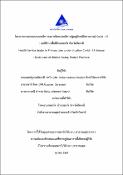บทคัดย่อ
โครงการวิจัยการออกแบบระบบบริการสุขภาพในหน่วยบริการปฐมภูมิภายใต้สถานการณ์ Covid-19 : กรณีศึกษาพื้นที่อำเภอยะรัง จังหวัดปัตตานี มีความมุ่งหวังให้บุคลากรเห็นความสำคัญของระบบบริการสุขภาพปฐมภูมิและสามารถปรับวิธีการทำงาน เพื่อตอบสนองปัญหาที่มีความซับซ้อนจนนำไปสู่การสร้างความเชื่อมั่น (trust) ในอนาคต ซึ่งประกอบด้วย 2 กระบวนการย่อย ได้แก่ ส่วนที่ 1 การทบทวนประสบการณ์การทำงานของบุคลากรในระบบบริการปฐมภูมิภายใต้สถานการณ์โรคระบาด Covid-19 ผ่านเรื่องเล่า โดยอิงกรอบแนวคิดการทำงาน primary care ของ WHO , กรอบการทำงานกับภาคีเครือข่ายในชุมชนและการวิเคราะห์ความซับซ้อนของสถานการณ์โรคระบาด มีการตอบสนองต่อนโยบายจากส่วนกลางร่วมกับมาตรการข้อตกลงระดับพื้นที่ เพื่อมุ่งสู่ 3 เป้าหมาย ได้แก่ 1) ความปลอดภัยของบุคลากรและผู้รับบริการ (2P safety) 2) ชุมชนเข้มแข็งจัดการโรค 3) การควบคุม/ยับยั้งโรคที่มีประสิทธิภาพ ส่งผลให้บุคลากรเกิดแรงจูงใจที่จะพัฒนาระบบบริการเพื่อตอบสนองปัญหาที่เกิดขึ้น ขณะเดียวกันผู้วิจัยเห็นถึงความจำเป็นเชิงนโยบายต่อหน่วยงานรับผิดชอบหลักระดับประเทศ ควรมีการเตรียมการความพร้อมทั้งโครงสร้าง งบประมาณและบุคลากรเป็นการเฉพาะต่อการรับมือโรคระบาดที่อาจจะเกิดอีกในอนาคต รวมถึงการตอบสนองต่อปัญหาโรคเรื้อรังที่อาจจะต้องใช้วิธีจัดการที่แตกต่างไปจากเดิม ส่วนที่ 2 การพัฒนาบุคลากรเป้าหมายเพื่อออกแบบบริการสุขภาพใหม่ ภายใต้ความสัมพันธ์และวิธีการทำงานใหม่ โดยใช้แนวคิดและกระบวนการ design thinking จนเกิดผลลัพธ์การออกแบบการทำงานและระบบบริการรูปแบบใหม่ที่ตอบสนองปัญหาสุขภาพที่ซับซ้อนในระดับพื้นที่ 4 ประเด็น 1) ปัญหาภาวะซีดในหญิงตั้งครรภ์ 2) การพัฒนารูปแบบการจัดบริการเพื่อให้กลุ่มเป้าหมายเข้าถึงบริการด้านสุขภาพ 3) การพัฒนารูปแบบดูแลฟื้นฟูสมรรถภาพผู้ป่วยโรคหลอดเลือดสมอง ระยะ Intermediate care 4) การพัฒนาระบบบริการผู้ป่วยโรคความดันโลหิตสูงและโรคเบาหวานที่ไม่สามารถควบคุมได้ จากการติดตามหลังจบกระบวนการ ผู้วิจัยพบว่า มีการเปลี่ยนแปลงทั้งด้านบุคลากรผู้ให้บริการต่อมุมมองความสำคัญของระบบบริการสุขภาพปฐมภูมิเพิ่มขึ้น สำหรับด้านผู้รับบริการเกิดความเชื่อมั่นที่จะเข้ารับบริการ ประเมินได้จากความร่วมมือในการร่วมฟื้นฟูสมรรถภาพผู้ป่วยโรคหลอดเลือดสมองในระยะ Intermediate care จำนวน 21 ราย พบว่า ผู้ป่วยมีระดับ ADL ที่เพิ่มขึ้นจำนวน 18 ราย (85.71%) และ ผลลัพธ์ด้านคลินิกที่ดีขึ้นจากตัวอย่างของหญิงตั้งครรภ์ที่มีภาวะซีด 22 ราย สามารถจัดการแก้ปัญหาจนไม่พบภาวะซีด 14 ราย (66.66%) นอกจากนี้ ทั้ง 4 ประเด็นกำลังเตรียมการพัฒนาเพื่อให้สามารถดำเนินการในสภาวะที่อาจจะมีโรคระบาดขึ้นอีก
บทคัดย่อ
The project, Health Service design in Primary care under situation Covid - 19 diseases Study case of district Yarang, Pattani Province., aimed to stimulate health personnel to recognize the importance of primary health care system and to design their own service delivery responding to unique context complexity at local level in the southern part of Thailand. The project consists of 2 processes as followed. 1) Self-review of Pattani’s health personnel in primary care system to respond to recommended procedures regarding the COVID - 19 epidemic control in communities. The procedures were based on the WHO primary care framework, a framework with community network partners and the analysis of the complexity of the epidemic situation. There has been a response to the government policies and agreements at the area level in order to achieve 3 goals, namely 1) Safety of personnel and provider, 2) Strong community for disease management, and 3) Effective disease control. As a result, target personnel could understand the complexity of the problems and be motivated to develop health service to respond problems that arise. At the same time, the researcher realized that the policy imperative to the main responsible agencies at the national level. There should be preparation and readiness of the whole structure, specific budgets and personnel to cope with future outbreaks and response to chronic disease problems that may require a different management approach. 2) Target personnel development for new health service design by using “Design Thinking” process. The result of the development was a new working design and service system responding to complex health problems at the local level in 4 issues: 1) Anemia problem in pregnant women, 2) Expanding the services access to vulnerable groups, 3) The development of rehabilitation service for stroke patients (Intermediate care), and 4) The development of health service systems for uncontrolled hypertension and diabetes patients. Regarding the new delivery processes design, it was found that the health personnel placed greater emphasis on the primary health care system and the patients were more confident about receiving the service, as evidenced by the co-rehabilitation of 21 stroke patients revealed that 18 patients (85.71%) had increased ADL levels and improved clinical outcomes in a sample of 22 pregnant women with anemia were able to manage the problem in 14 cases (66.66%) without anemia. In addition, all four services were prepared in order to response to the potential recurrent of COVID-19 epidemic in Pattani.


